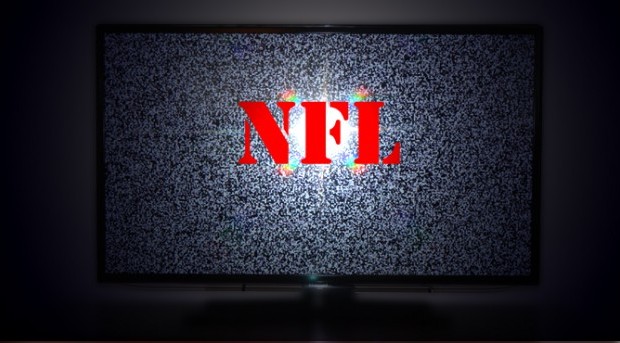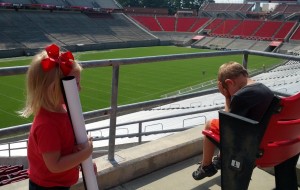The FCC’s Sports Blackout Rule: What elimination would and would not mean for consumers
There is renewed pressure on the FCC to eliminate its nearly forty year-old “sports blackout rule.”
Updated December 18, 2013: The FCC voted today to end the Commission’s blackout rules. While an important move by the Commission, it recognized that “elimination of our sports blackout rules alone might not end sports blackouts, but it would leave sports carriage issues to private solutions negotiated by the interested parties in light of current market conditions and eliminate unnecessary regulation.”
Updated November 4, 2013: Acting FCC chairwoman Mignon L. Clyburn proposed the elimination of the Commission’s blackout rules (pdf) on November 1, 2013, stating that while “elimination of our sports blackout rules will not prevent the sports leagues, broadcasters, and cable and satellite providers from privately negotiating agreements to black out certain sports events … if the record … shows that the rules are no longer justified, the Commission’s involvement in this area should end.”
On May 17, 1939, the National Broadcasting Company (NBC) spent $3,000 to televise a relatively inconsequential college baseball game between Columbia University and Princeton University. The outcome of this game—a 2-1 victory for Princeton—is far less significant than what it represents. Instead, the importance of this game is based on its hallmark in both the television and sports entertainment industries as the first televised sporting event in United States history.
Today, the market for televised sports is a billion-dollar industry. Of the “big four” (MLB, NBA, NFL, and NHL), the National Football League (NFL) generates the greatest amount of television revenue. Presently, the NFL’s annual television revenue exceeds five billion dollars; this amount will soar to over seven billion dollars annually beginning next year. Indeed, “31 of the 32 most-watched television shows in the fall of 2012 were NFL games.”
Since 1975, the Federal Communications Commission (FCC) has imposed what is commonly referred to simply as the “sports blackout rule.” The rule, which affects NFL broadcasts almost exclusively, prohibits local broadcasts of sporting events when ticket sales do not meet a certain threshold. In response to a petition in January 2012, the FCC began seeking public comment on the possibility of eliminating the rule. There is also renewed energy on Capitol Hill to abolish the rule, led by Senator John McCain’s recent introduction of the Television Consumer Freedom Act of 2013.
The sports blackout rule leveled the playing field between local broadcast television stations—which were already required to black out non-sellout local games—and cable and satellite providers.
The FCC’s current sports blackout rule was preceded by a series of events that occurred in the 1950s and 1960s. In 1953, Judge Grim, a federal district court judge in the Eastern District of Pennsylvania, ruled that the NFL was in violation of the Sherman Antitrust Act, based on a provision in the league’s bylaws designed to control the sale of television rights by its member teams. Eight years later, in 1961, Judge Grim enjoined the NFL from entering a pooled-rights agreement with Columbia Broadcasting System (CBS). As Judge Grim observed, the pooled-rights agreement at issue in the 1961 case represented a fundamental shift in how NFL television contracts were negotiated:
Prior to this contract each member club individually negotiated and sold the television rights to its games to sponsors or telecasters with whom it could make satisfactory contracts. The NFL-CBS contract sharply departs from this practice. It is implicit in the 1961 contract that the member clubs have agreed among themselves and with the league that each club will not sell its television rights separate and apart from those of the other clubs, but that each club will pool its television rights with those of all of the other clubs, and that only the resulting package of pooled television rights will be sold to a purchaser.
Enter the combined lobbying arm of the National Football League and the television industry. In 1961, Congress passed the Sports Broadcasting Act of 1961 as a result of the combined lobbying of the NFL and the television industry, effectively undoing Judge Grim’s decision. While the most notable provision of the Act carved out an antitrust exemption for pooled-rights agreements entered into by professional sports leagues, it also permitted blackouts of games in the local market in which the game was played. Subsequently, in 1973, Congress amended the Sports Broadcasting Act to allow such local blackouts only when the game was not a sellout as of seventy-two hours prior to the scheduled game time. While these amendments were not renewed (and thus expired in 1975), the NFL nevertheless continued the policy of requiring local providers to black out local games that did not sell out.
Ultimately, in 1975, the FCC adopted its sports blackout rule as it exists in its current form. In essence, the rule leveled the playing field between local broadcast television stations—which were already required to black out non-sellout local games—and cable and satellite providers. If a particular game is blacked out on local broadcast television, the FCC requires that the game is also blacked out in that area by cable or satellite providers.
Most blackouts are the result of private, contractual agreements.
As the FCC appropriately points out on its website, most blackouts are the result of private agreements:
In almost all circumstances, the blackouts of sports events are the result of contractual agreements between the content owners (i.e., the sports leagues) and the programming distributors (i.e., the broadcast networks and stations, and the cable and satellite television channels and systems).
For example, there is a great deal of frustration over the blackout policies of Major League Baseball (MLB). The MLB utilizes a complex model where each team is assigned a territorial area. For some areas, this model creates bizarre results: Iowa and Las Vegas are each blacked out for six franchises. In any event, a decision by the FCC to eliminate its blackout rule would not affect situations like those that occur in the MLB. MLB blackouts result from complex, purely contractual arrangements that exist and will continue to exist, bearing no relation to the FCC rule or to the number of tickets sold at the stadium. Of the “big four” professional sports leagues in the United States, the NFL is the only one to black out local broadcasts of non-sellout home games.
The utility of the FCC rule may be questionable, given that professional sports leagues other than the NFL adequately protect organizational interests via privately negotiated blackout policies. A recent petition sponsored by the Sports Fan Coalition—the self-proclaimed “largest nonprofit fan advocacy organization in the country”—decries the rule, questioning the FCC’s role in the realm of television blackouts: “At the very least, the government should not be in the business of propping up sports leagues’ blackouts.”
“When the venue in which these sporting events take place has been the beneficiary of taxpayer funding, it is unconscionable to deny those taxpayers who paid for it the ability to watch games on television when they would otherwise be available.”
Senator John McCain has recently taken a stand against the FCC’s sports blackout rule. Senator McCain’s proposed Television Consumer Freedom Act of 2013 (pdf) (TCFA) seeks to transform the television industry by paving the way for a la carte offerings. In addition to these changes, the bill would also “prohibit the application of sports blackout regulations to the broadcast of a sporting event taking place in a venue the construction of which was financed, in whole or in part, by the Federal Government or a State or local government.”
Notably, the TCFA would not strip the FCC rule entirely; rather, it would prohibit blackouts of games played in publicly funded stadiums. Since 1997, nineteen of twenty newly renovated or newly constructed NFL stadiums have relied on public funding (pdf). Senator McCain recently stated that “[w]hen the venue in which these sporting events take place has been the beneficiary of taxpayer funding, it is unconscionable to deny those taxpayers who paid for it the ability to watch the games on television when they would otherwise be available.” When pitted against the massive lobbying power of the pay-tv industry however, it is unclear if such a disruptive piece of legislation will find success on Capitol Hill.
In the event that the TCFA is not successful, Senator McCain has also co-signed a letter to the FCC urging the agency to eliminate the rule on its own authority:
It is important to note that Congress never instructed the Commission to promulgate the Sports Blackout Rule in the first place. The Commission therefore possesses ample authority to amend the Sports Blackout Rule sua sponte, without any action by Congress.
The historical justification for the rule has been that it preserves ticket sales. However, an elaborate study, conducted by nine leading sports economists in a filing with the FCC, ultimately concluded (pdf) that “[b]lackouts have no significant effect on ticket sales in the NFL and increase no-shows only when the weather is bad.”
For its part, the NFL did lower the threshold for percentage of seats that must be sold to prevent a blackout. Now, at the discretion of the home team, the blackout may be avoided where eighty-five percent of tickets have been sold.
Eliminating the FCC’s sports blackout rule would go a long way toward establishing the government’s role in the matter as one of complete neutrality.
Blackouts are notorious among sports fans. Eliminating the FCC’s sports blackout rule would certainly not solve all of these qualms. Blackouts will continue to exist in certain capacities, regardless of the continued viability of the FCC’s sports blackout rule. Nevertheless, eliminating the rule would go a long way toward establishing the government’s role in the matter as one of complete neutrality. The study conducted by leading sports economists articulated that “[t]he main reasons to abandon the FCC’s blackout rules are, first, to get rid of unnecessary regulation and, second, to erase an official government endorsement of an NFL policy that harms consumers and that has been voluntarily abandoned by all other professional sports leagues.”






